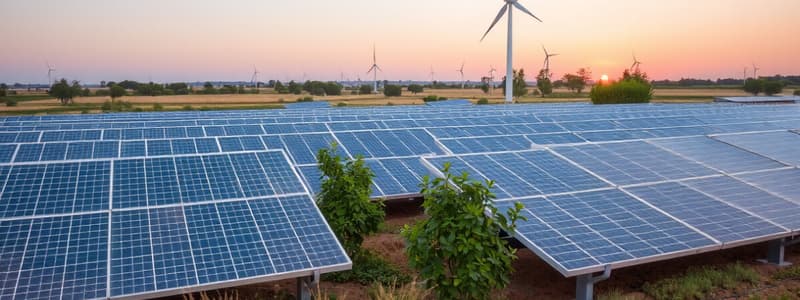Podcast
Questions and Answers
What defines a renewable resource?
What defines a renewable resource?
- Resources that are naturally replenished as they are being used (correct)
- Resources that require significant technology to produce
- Resources that deplete over time with usage
- Resources that are not affected by human activities
Which of the following is NOT an example of a renewable resource?
Which of the following is NOT an example of a renewable resource?
- Hydropower
- Wind energy
- Natural gas (correct)
- Solar energy
How does a renewable resource differ from a non-renewable resource?
How does a renewable resource differ from a non-renewable resource?
- Renewable resources are only used in specific regions.
- Renewable resources are constantly used up and cannot regenerate.
- Renewable resources can be used indefinitely without diminishing. (correct)
- Renewable resources require complex extraction processes.
What implication does the use of renewable resources have for energy sustainability?
What implication does the use of renewable resources have for energy sustainability?
What is a potential limitation of renewable resources?
What is a potential limitation of renewable resources?
Flashcards are hidden until you start studying
Study Notes
Renewable Resources Definition
- Renewable resources are natural resources that can be replenished naturally over time, such as solar energy, wind, and biomass.
- They are virtually inexhaustible in the short term, as they are sourced from perpetual processes of nature.
Non-Renewable Resource Example
- Fossil fuels, like coal and oil, are NOT considered renewable resources due to their finite availability and long geological formation times.
Difference Between Renewable and Non-Renewable Resources
- Renewable resources are sustainable and maintainable, while non-renewable resources deplete over time and can lead to resource scarcity.
- Use of renewable resources minimizes environmental impact and contributes to lower carbon emissions, whereas non-renewable resources often result in pollution and depletion.
Implication for Energy Sustainability
- Utilizing renewable resources promotes energy sustainability by reducing dependency on finite resources and decreasing the environmental impact of energy generation.
- Transitioning to renewables fosters a sustainable energy future, which can meet present needs without compromising the ability of future generations to meet theirs.
Potential Limitation of Renewable Resources
- Intermittency is a key limitation; many renewable resources, such as solar and wind, are not consistently available due to natural variability, necessitating advancements in energy storage technologies.
Studying That Suits You
Use AI to generate personalized quizzes and flashcards to suit your learning preferences.



